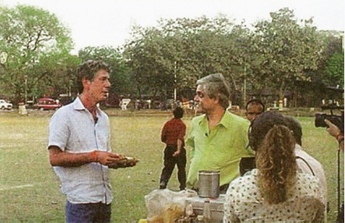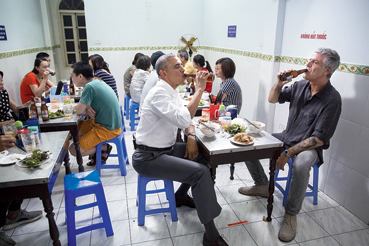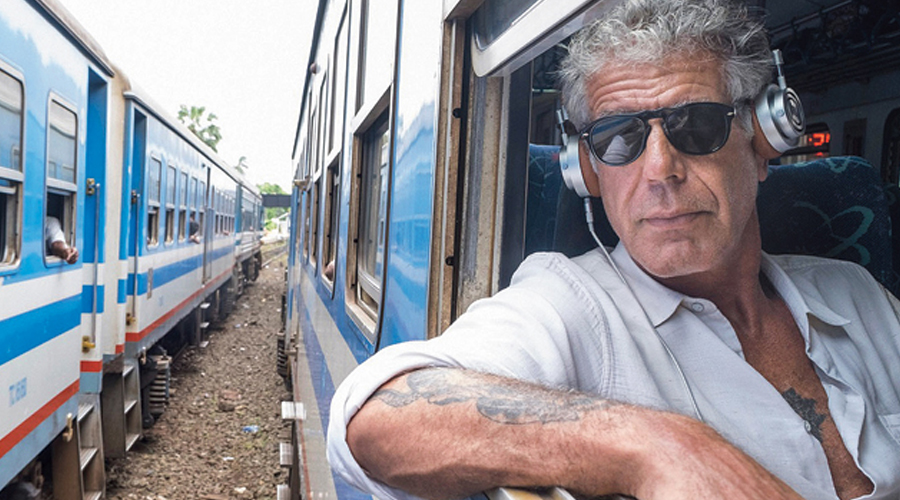The last year or so, we have been living in a world shaped by what the writer Adam Lewis calls alternyms, one in which unite has given way to untie, protect has slipped into protest and whole now has a gaping hole, yet a few high-profile fiends haven’t become friends; no, they don’t even try to be mellow. It’s a world where Anthony Bourdain’s grim words need not walk incognito. It’s a world he slipped into on a summer’s day in June and left in a huff that very month, a little over six decades later. He spent his time wisely, standing up for those who don’t believe in maintaining status quo and sitting down to dine with people to find the meaning of peace.
Deep into what is more like a tribute to the world he left behind rather than his last book, World Travel: An Irreverent Guide, which has hit shelves, realisation dawns that this could well be the ultimate book for a wanderer as and when they begin to hit the roads. Or perhaps it’s a collection of wise nuggets from a people’s champ (sorry Rock!). Maybe it’s a template for future travel books.
One essay gives way to another, stitching together things the chef-author had spoken about, punctuated by thoughts from some of Bourdain’s friends, family members and colleagues. Thanks to Laurie Woolever, whom the man addressed as his “lieutenant”, it’s Tony, left, right and centre. Having worked with him since 2009, she definitely earned the right to throw around his nickname.
Reluctant optimist
A few pages into the book, and his love for Asia is obvious. The reader plops down in Rajasthan where “it really doesn’t matter where the road takes you”, he writes. “It doesn’t matter where you find yourself when you wake up. Of all the places in the world, it has perhaps the biggest heart and the most beautiful thing to see. Whether you wake up in a Maharana’s palace or a swank hotel or a cheap hostel or a sand dune in the desert, you’re grateful to be alive and still in India.”
The kind people and delicious cuisine of Rajasthan won Tony over as much as the fields of Cambodia (“Rice paddies whipping by, the music in our skull just right. If something profound ain’t happening, at least it feels like it is”) and the smell of motorbike exhaust and pork grilling over charcoal in Vietnam (“It grabs you and doesn’t let you go. Once you love it, you love it forever”).

‘Calcutta and Bombay are the two cities that remind me most about my hometown, New York City with the dense interweaving of classes and cultures,’ Anthony Bourdain said during an episode of No Reservations while visiting Calcutta and meeting musician and food critic Nondon Bagchi. Picture: The Telegraph
The book has been published around the time Americans are beginning to travel again, even if that’s to a restricted list of destinations. Though at times one may get the feeling of the book being a travel guide — something Bourdain wasn’t a big fan of (“I like atmospherics. I don’t want a list of the best hotels or restaurants; I want to read fiction set in the place where you get a real sense of what that place is like,” he said during South by Southwest in 2016) — words bring alive many of the images that stayed on with him.
Woolever, or the “lieutenant”, first met Bourdain in 2002 when her former employer, the chef Mario Batali, recommended her as a “recipe tester and editor” for Anthony Bourdain’s Les Halles Cookbook. Years later, she became his assistant. The blueprint for the book has been helped by a recording of a conversation she had with Bourdain in spring 2018, soon after which the bad news arrived. The chitchat took place at a time when “he had picked up smoking again, a number of years after quitting” and had installed at his Manhattan high-rise apartment an “industrial-strength smoke-eater machine” seen often in casinos and bars.
The question after Tony’s death was whether the world needs the book. Admiration for the chef-turned-documentarian hasn’t waned, more so after the world hunkered down early 2020 and the travel/hospitality industry caved in. Perhaps it’s in his acid wit and reluctant optimism that shoots of revival can be seen.
Sitting on a plastic stool, letting his thoughts wander in a bowl of noodles is the way he is remembered, an observation that’s captured on the cover of the book. It’s a picture that a person like Barack Obama as well as his friend Eric Ripert won’t forget. After Bourdain’s death, the former US President’s tweet summed it up perfectly: “‘Low plastic stool, cheap but delicious noodles, cold Hanoi beer.’ This is how I’ll remember Tony. He taught us about food — but more importantly, about its ability to bring us together. To make us a little less afraid of the unknown. We’ll miss him.”
Jumbo shrimp living
Equally missed will be his unique way of looking at the world. He might as well have been an oxymoron of sorts, like jumbo shrimp, controlled chaos and friendly fire. The words of Graham Greene are not lost on Bourdain: “He gave the impression that very many cities had rubbed him smooth.”
More than a dozen years ago, while interviewing him I had asked him what makes food special while visiting a new place. “So many of the things I’ve seen in the countries around the world I never would have been allowed to see and so many of those experiences I never would have had if I hadn’t shown a willingness to sit down with local people and eat and drink whatever is offered. I think when you start with the food, with the markets, what people eat in their everyday lives, those countries open up to you in ways that a normal tourist would never see.”

After Anthony Bourdain passed away on June 8, 2018, former US President Barack Obama tweeted: “‘Low plastic stool, cheap but delicious noodles, cold Hanoi beer.’ This is how I’ll remember Tony. He taught us about food — but more importantly, about its ability to bring us together. To make us a little less afraid of the unknown. We’ll miss him.”
He never saw himself as a Gordon Ramsay or a Thomas Keller. “I’m very aware of the fact that I’m lucky. I was a mediocre chef and I’m lucky enough to be able to go anywhere I want to go in the world and make television shows about it. So I try to keep that in mind,” he said.
Instead, he chose to champion a few causes that he believed in, like his war on fast food. To him a person like Jamie Oliver is a hero. There was a time when he hated The Naked Chef “and all that matey, mockney b***s***,” he wrote in an article in The Guardian. But later, Oliver earned his respect by the way he has popularised healthy eating among school kids. The English chef has gone to great lengths to prove what a study had also found, about how children are more inclined to eat “difficult” foods like liver, spinach, broccoli when served correctly.
This was a man who didn’t mince words when pleading with viewers to appreciate local culture, be it food, music, films or culture. Instead of trying hotdogs in Barcelona, try chorizo. Be willing to learn from the people you meet instead of entering a new territory with assumptions and narratives that you have been spoon-fed for ages. The idea is to appreciate the people you meet, whether at a five-star property or a village hut.
Outside our doors is devastation. People will, of course, grieve in their own way but consolation also comes in way of well-thumbed books and past voices who thankfully refuse to fade, like Bourdain’s. Next month, it will be three years that his unending flow of metaphors ceased. But then, what is death? In the words of the late professor Henry Scott Holland: “Death is nothing at all. It does not count. I have only slipped away into the next room. Nothing has happened. Everything remains exactly as it was. I am I, and you are you, and the old life that we lived so fondly together is untouched, unchanged.”
Perhaps it’s the kind of rhetoric Bourdain may have wallowed in had he been around and forced to take a long shelter from the storm at his Manhattan address. Instead he has left behind a quotable quote to lead life by: “I’m a big believer in winging it. I’m a big believer that you’re never going to find the perfect city travel experience or the perfect meal without a constant willingness to experience a bad one. Letting the happy accident happen is what a lot of vacation itineraries miss, I think, and I’m always trying to push people to allow those things to happen rather than stick to some rigid itinerary.”
Convictions he had in plenty and revisiting any of his TV shows will still throw up brutal truths about the food industry but, at the same time, he made the world we live in appear saner than we can imagine it to be at the moment. Look up into the night sky to find that classic Beatles line piercing the silence: “And in the end, the love you take, is equal to the love you make”. Tony is attending the gig in the sky while we have World Travel: An Irreverent Guide in our hands.
Making them kitchen confidential
With Anthony Bourdain’s kind of personality, it’s obvious that anyone who’s in a similar field will get influenced in some way. What I liked was his storytelling. He would weave food into a story, which was very different. Another thing was that most of the material was so well researched but it never seemed that way and there was something easy-going. That’s something I could relate to. The richness of content is something you can feel. While he started as a chef, he was never in his chef coat for any of his shows and that’s something I would give as an example to brands too. That’s something evolved because it’s cutting that barrier of being just a chef — Sanjeev Kapoor, Padma Shri awardee chef, television personality and owner of FoodFood channel
His biggest contribution was in getting the true picture of the kitchen. The work he did in Kitchen Confidential was very inspiring for the young generation as he inspired them to come to the kitchen — be a chef, which wasn’t happening because the youngsters didn’t find it “cool”. There were different shades of him in the kitchen… funny, notorious, sad, happy but whatever it was, it was still sexy. His television shows were no-nonsense. You have to have that confidence about your knowledge and what you are doing to do what he did — Manish Mehrotra of Indian Accent
Anthony Bourdain has certainly been very inspirational, for that matter to any chef or a traveller with a serious will to explore. He was (all) about exploring and understanding culture, demographics, impact of historical incidents… and his travel shows encompass all this knowledge in a very captivating manner. Bourdain’s depiction was robust, witty, gossipy, outrageous, and informative and he wasn’t shy of calling a spade, a spade. I genuinely loved his style and appreciated the straight-cut facts. He always glorified street food and intriguing local delicacies and why not, these are the crux of modern cooking and most is built on it — Surjan Singh Jolly, corporate culinary director and business development head of Speciality Hospitality UK and a former judge of MasterChef India
It’s always important to learn whenever you can and Anthony Bourdain had a flair to be able to learn anything he did. Over the years, one saw him respect other cultures more and more and that’s something we have admired greatly about him… the fact that he could understand the differences that exist amongst us is what make the world a better place. Food is the best way to understand a culture and he understood that. We do a job that requires a great of understanding and acceptance of things and he was a great ambassador for that. We have been working on regional food for 14 years and it’s considered fashionable today. Our most recent show was more Anthony Bourdain-esque and more about the culture of a place like Goa — Rocky Singh and Mayur Sharma, aka Rocky and Mayur, authors and television show anchors
His book came out the year I joined culinary school (Culinary Institute of America) and obviously, it was a big thing because we share the alma mater. There was a lot of pride… the book was a very unabashed telling of his own story and it did away with all the glorification that tends to happen so, he was a bad-boy chef in many ways. So smitten were my friends and I as students that we went to his restaurant — Les Halles in Manhattan. It was when he had a book to his name, couple of articles for The New Yorker and before he came on TV. We shared a smoke and spoke briefly. He was very approachable, affable and nice guy. He empowered a bunch of us in that particular time and setting into manifesting identities as we grew as chefs — as real, grounded, outspoken people. A lot of people who walk the talk and are the personification of themselves, don’t put up a plastic persona — Manu Chandra, chef-partner, Olive Group of Restaurants
As told to Nandini Ganguly
